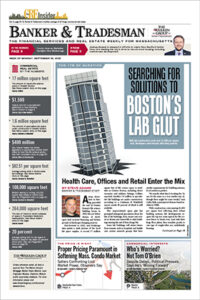
State Rep. James O'Day of West Boylston and state Sen. Jason Lewis of Winchester give a presentation on their proposal for a surtax on incomes over $1 million. Photo courtesy of State House News Service / Katie Lannan.
As lawmakers and advocates try again to impose a surtax on incomes over $1 million, they’re confident a new attempt can survive a potential legal challenge and meet constitutional requirements.
The Supreme Judicial Court in June 2018 derailed a proposal to amend the state constitution to assess a higher tax rate on people with the largest annual incomes, erasing what had been eyed by Democrats on Beacon Hill as a new revenue stream to fund education and transportation projects.
The high court ruled that the ballot question, which had been on track to go before voters in November, unconstitutionally mixed the two different spending priorities and a major change in tax policy.
“Regrettably, when we got to the finish line, we ran into a bump here and there and it was determined that our previous Fair Share Amendment didn’t meet constitutional muster, but that is not going to happen this time,” state Rep. James O’Day, D-West Boylston said at a State House briefing Tuesday on a new version of the tax proposal. “We’re happy to have folks with us today that are going to put your mind at ease on that.”
O’Day and state Sen. Jason Lewis, D-Winchester, refiled the surtax (S 16, HD 3300) – known as the millionaires tax or the Fair Share Amendment – this year as a legislative amendment instead of the citizen’s amendment version that was scuttled last year.
Unlike citizen’s amendments, legislative amendments are not required to contain only related or mutually dependent subjects, attorney Patrick Moore said.
Moore, a partner at the Boston firm Hemenway & Barnes who formerly served as deputy counsel to Gov. Deval Patrick and clerked for Supreme Judicial Court Justice Robert Cordy, said the Legislature’s authority to amend the Constitution is “incredibly broad.” A legislative amendment is still required to align with provisions the U.S. Constitution, which he said would be an “easy question” when it comes to the surtax.
Amendments introduced by lawmakers need “a majority of all the members elected” – 101 votes in the 200-seat Legislature – in two consecutive sessions, before advancing to the ballot.
In 2016 the surtax ballot proposal, in the form of a citizen’s petition, cleared the Legislature on a 135-57 vote, and the next year it passed 134-55. Lewis noted both of those votes represented nearly 70 percent support, and said there “really is no difference” in the substance of this year’s proposal.
Lewis, recently named the Senate chairman of the Education Committee, said Massachusetts has “tremendous needs” the surtax could help address.
“We need to adequately fund our public schools. We need to make more affordable early education available to families,” he said. “We need to make sure that our students can go to public colleges and universities and not be burdened with a lifetime of debt, and we need to have a transportation system, particularly public transportation, that works for all of our families and our businesses throughout the state. That is pretty much undeniable. I think everybody agrees with that. The challenge is how do we pay for it, and I believe it’s not fair to put that burden on the backs of our middle income families.”
Opponents to the surtax have argued that it could lead to an exodus of wealth from the state, along with tax revenues associated with higher-income households.






